Some press gains are reported in Georgia, Ukraine and Kyrgyzstan but the Color Revolutions have yet to deliver lasting reforms.
| TBILISI, Georgia |
Posted May 9, 2007
|
|
|
When 30 National Security Ministry agents tried to raid the independent television station Rustavi-2 in October 2001, days after it had reported explosive allegations of government corruption, Station Manager Nika Tabatadze refused to let them in. Instead, he broadcast the standoff live, and declared: “This is all happening on political orders from authorities.” Hundreds of supporters thronged the building–and the agents retreated.
This stirring success emboldened opposition movements in Ukraine, where the Orange Revolution of November 2004 ushered in new, open elections; and in Kyrgyzstan, where the Tulip Revolution of March 2005 opened the way for a new coalition government. The reformists who took office in the “Color Revolutions” pledged far-reaching democratic changes, including policies to promote independent news reporting. Yet for all its promise, the post-revolution era in these former Soviet states has so far failed to bring about lasting transformation of news media as independent sources of information, a CPJ analysis has found. Some modest improvements have been seen: Government officials in all three countries have used less overtly aggressive measures to control the news media; legislative gains such as the decriminalization of libel in Georgia have been achieved; and, at least for a time, physical attacks on the press declined in both Georgia and Ukraine. But the countries ‘ new leaders have implemented few broad reforms to insulate the media from political influence, CPJ found after conducting dozens of interviews with journalists, analysts, politicians, and others in all three countries. In Ukraine , presidential promises to remake Soviet-style state broadcast outlets into publicly funded but politically independent stations have gone unfulfilled. Kyrgyz officials still place government loyalists in important state news media positions. Government harassment continues in Georgia, where questionable tax investigations have been launched against critical media outlets. Economic factors are intertwined. In Georgia and Ukraine, much of the national media are owned by businesspeople with close government ties. It’s not suprising, then, that the Georgian government has successfully pressured or persuaded private media owners to tone down coverage and to replace critical journalists. Rustavi-2 is a good example. Its sharply critical news coverage has been dulled after two politically inspired business takeovers. Tabatadze, the station manager whose defiance helped lead to revolution, lost his job in a 2006 shake-up. His replacement: a presidential ally who had no broadcast experience. “New authorities have this mentality that either you are with us or you are against us,” said Sofia Chaava, a former Rustavi-2 reporter who was among six journalists who resigned from the station in 2006 to protest government influence. “They understand and are afraid of broadcast media because of the role journalists played in the revolution.” Media consumption is similar in the three nations–citizens overwhelmingly rely on television news–although political conditions differ. The revolutions in Georgia and Ukraine stood out for having relatively cohesive and pro-Western movements with clear reform programs and charismatic leaders. The more chaotic and violent upheaval in Kyrgyzstan relied in part on pro-Russian politicians who lacked such clearly defined programs. To varying degrees in all three countries, “one faction of a divided elite took over from another, ” said Martha Brill Olcott, a Washington-based analyst for the Carnegie Endowment for International Peace, in testimony to the U.S. Congress. To be sure, these coalitions were forming governments in chaotic circumstances, attempting to take control of corrupt and ineffective bureaucracies while confronting regional rivalries that had been suppressed for decades. Kyiv sought to balance Ukraine’s pro-European western regions with its pro-Russian eastern areas. Tbilisi worked to reintegrate ethnic Abkhazians and Ossetians living in two Kremlin-backed separatist regimes in northern Georgia. And Bishkek had to reconcile the politically dominant, Russified north with the more religious, impoverished, and culturally Uzbek south. While these new central governments have been less aggressive in harassing the media, the continuing lack of judicial and regulatory reform has nonetheless left media outlets in need of influential patrons. Political parties, the business elite, and senior government officials have moved assertively to fill the vacuum. “Both the ruling and opposition parties all look at television as a tool to solve their own political problems … not as a business but as an instrument used for bargaining and pressure, ” said Tatyana Lebedeva, director of the Kyiv-based National Council for Television and Radio Broadcasting.
GEORGIA In late 2003, a coalition of young pro-Western politicians, pro-democracy groups, and local media rallied Georgians to protest against Shevardnadze, the former Soviet foreign minister whose decadelong rule as president was characterized by bureaucratic incompetence and two brutal wars with Russian-backed separatists in northern enclaves.
Against this backdrop, a U.S.-educated lawyer named Mikhail Saakashvili burst into parliament–and into the public’s imagination–in November 2003, carrying a rose to protest that month’s fraud-marred national elections. In the peaceful revolt that followed, Shevardnadze resigned, and Saakashvili swept the rescheduled presidential election in January 2004.
During the first several months of Saakashvili’s administration, the country’s influential television stations–including Rustavi-2, state television Channel 1, Imedi, and Mze–all canceled popular political talk shows amid speculation that senior government officials had asked media owners to ease critical programming. In summer 2004, Rustavi-2 owner Erosi Kitsmarishvili quietly sold the channel after then-Prime Minister Zurab Zhvania denounced the station for covering corruption allegations linked to Zhvania’s brother. Politicized regulation of broadcast media also rewarded those who supported the government. The Georgian National Communications Commission–whose top members are appointed by the president–revoked Lomisa TV’s license for failing to meet an application deadline, but allowed the more docile Rustavi-2 to keep its license when that station missed the same deadline, according to local press reports. With advertising revenue low, media companies relied on investment from businesspeople who often influenced editorial policies to promote their commercial activities. Control of Rustavi-2 was sold first to Kibar Khalvashi, a businessman with ties to Defense Minister Irakli Okruashvili, and then to a holding company known as Geotrans, which has continued on a tack sympathetic to the government. “When the media owners are pro-government, journalists are not protected from bureaucrats who interfere in their work,” said Genadi Uchumbegashvili, director of the Tbilisi-based media training organization Internews Georgia. “Many businessmen invest in media to protect their business interests.” The independent television channel 202 briefly emerged as a prominent source of opposition views until it was undermined by a scandal of its own: Authorities convicted station executives Shalva Ramishvili and David Kokheridze in 2006 on charges of extorting 54,000 lari (US$32,000) from parliamentarian Koba Bekauri in exchange for suppressing critical coverage of his business activities. While the president sometimes spoke in defense of press freedom–“If someone dares to put pressure on the media, I would be his worst enemy,” he said in September 2005–he also defended politicians who abused journalists. In December 2005, Imereti Gov. Akaki Bobokhidze brutally beat Rioni TV journalist Irakli Imnaishvili following a live debate. Bobokhidze resigned but was not criminally charged in the attack–which left Imnaishvili with a concussion and a broken nose–and he enjoyed vigorous support from Saakashvili, who praised the governor as someone who “never betrayed his principles or his country.” Ana Dolidze, director of the Georgian Young Lawyers’ Association, said her group urged that charges be filed against Bobokhidze, “but the prosecutor decided not to open a case because he said the journalist’s injuries were ‘very slight.'” She added: “Saakashvili’s comments sent a message to politicians that if you feel cornered by the media, you can do the same thing.” The president’s approval ratings have since dropped amid public dissatisfaction with a low standard of living and continued corruption. That, in turn, has led to greater government pressure on the media in the past year, numerous journalists said. Badri Patarkatsishvili, reportedly the country’s wealthiest tycoon, accused Saakashvili’s administration of harassing him with tax inspections after Imedi TV, part of his radio and television broadcast company, reported accusations that Interior Ministry officers fatally beat a banker.
A week after the resignations, Imedi announced that it had formed a partnership with Rupert Murdoch’s U.S.-based News Corporation, partly as a buffer against the Saakashvili administration. “We have been very eager to have a Western partner,” Imedi News Director Giorgi Targamadze said. “Not just for economic reasons … but we also wanted additional guarantees that the government won’t interfere in our editorial policies.” 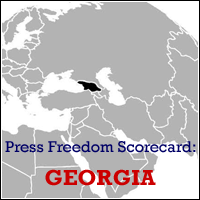 Saakashvili’s hand in media management may be strengthened later this year, when parliament is set to consider a controversial bill that would impose a code of conduct on broadcast media. The proposed code would broadly regulate the content of broadcasts and the manner of their production, while setting up complaint mechanisms. The bill’s vague language is itself a cause for alarm in the view of many journalists. “Journalists expected a lot more from this government,” said RFE/RL’s Chikovani. “We’re still in a transitional period, and it is not clear how this will all end.”
UKRAINE 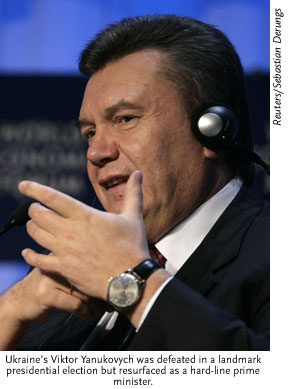 In 2004, President Leonid Kuchma used pro-government television stations to support a rigged election intended to hand over power to his loyal protégé, Prime Minister Viktor Yanukovych. Though he had plenty of tools–Kuchma directed the message on state channel UT-1 and effectively controlled the private stations 1+1, Novy Kanal, STB, and Inter–the vote-fixing was so extensive that news of it trickled out, and hundreds of thousands of people flooded the streets of Kyiv to demand a new election. In 2004, President Leonid Kuchma used pro-government television stations to support a rigged election intended to hand over power to his loyal protégé, Prime Minister Viktor Yanukovych. Though he had plenty of tools–Kuchma directed the message on state channel UT-1 and effectively controlled the private stations 1+1, Novy Kanal, STB, and Inter–the vote-fixing was so extensive that news of it trickled out, and hundreds of thousands of people flooded the streets of Kyiv to demand a new election. The public protests set the stage for challenger Viktor Yushchenko to win the rescheduled vote in December 2004. Inaugurated a month later, Yushchenko pledged to implement media reforms–and, in fact, his new government immediately stopped issuing to editors covert directives known as temnyky, a tactic the Kuchma administration had relied on to control news coverage. Yushchenko also said he would prosecute officials implicated in the September 2000 beheading of muckraking Internet journalist Georgy Gongadze, whose death became a symbol of the Kuchma administration’s abuses. Three police officers are now on trial for the murder–a fourth suspect fled–but the prosecution has not pursued the top government officials who may have ordered the killing. Yushchenko himself was silent after a parliamentary report concluded that Kuchma had ordered the murder.
Disillusionment with Yushchenko’s unfulfilled pledges contributed to a poor third-place showing for his Our Ukraine coalition in March 2006 parliamentary elections. Yushchenko’s political problems, in turn, appeared to stall his efforts to privatize regional state media and transform the National Television Company of Ukraine, the country’s Soviet-style state broadcaster, into an independent public service broadcaster. The 2006 parliamentary vote also marked a dramatic comeback for Yanukovych and his Party of Regions, which captured 186 out of 450 seats. Yushchenko named Yanukovych as prime minister, and the men temporarily put aside their political rivalry by signing a so-called Declaration of National Unity. By spring of this year, the “unity” team had unraveled amid calls for a new government, but the Party of Regions appeared as strong as ever. “The Party of Regions will have a more assertive role with state television and the government’s overall information policy, and it will have a more aggressive policy toward the independent media,” said Natalia Ligachova, editor-in-chief of the Kyiv-based magazine Telekritika . The Party of Regions appeared intent on proving that point immediately. Oleh Kalashnikov, a party deputy, and several aides seized a videotape from two STB journalists covering a July 2006 rally, while, more ominously, fellow party deputy Vasily Kiselyov introduced a bill to re-establish libel as a criminal offense. News executives have been left to seek political shelter. “Media owners are trying to gain security in different ways, by collecting compromising information on the police, forming associations, or being careful about what they publish,” said Irina Sadova, director of the Kyiv-based Association of Regional Newspapers. “Some owners are going into local politics because they feel vulnerable and realize they need some additional protection.” 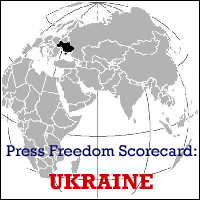 Individual journalists also remain vulnerable to outside pressures, since police, prosecutors, and the courts are still politicized. “You can write what you want, but I don’t feel this is a stable situation because the court system can still be manipulated against you, just like in Kuchma’s time,” said Gazeta Po-Kyivsky Editor-in-Chief Serhiy Tihiy. “The method of pressure can be more indirect–like sending fire inspectors after you.” One potential bright spot: The advertising market has grown rapidly over the last few years, reflecting increased economic growth and rising consumer spending, the news agency Interfax-Ukraine reported. “This is creating conditions for media to work more as a profitable business and less as an instrument of politics,” said Oleg Homenok, a media adviser for the Kyiv-based media training organization IREX-Ukraine. “But this also means that advertisers can dictate what to write about and what not to write about.”
KYRGYZSTAN Askar Akayev, the former physicist who in 1991 became Kyrgyzstan’s first post-Soviet president, may have had some democratic instincts initially, but he eventually abandoned them in favor of an authoritarian approach. Akayev appointed family members to high-level government posts and allowed them to take over certain sectors of the economy. Kyrgyzstan’s five million citizens–known for their independent, nomadic tradition and moderate practice of Islam–became increasingly resentful of these nepotistic policies, which had left them impoverished. A popular uprising named the Tulip Revolution erupted in early 2005, after Akayev tried to manipulate parliamentary elections and silence criticism in the independent media. Angry protesters forced Akayev to flee the country, clearing the way for a loose coalition of opposition politicians led by former Prime Minister Kurmanbek Bakiyev. The coalition vowed to privatize state media, create a public service broadcaster, and decriminalize libel. While a better press freedom climate emerged in the following months, journalists continued to face political pressure and occasional physical attacks.
By the end of 2005, however, authorities were putting increasing pressure on editors to stem criticism of the Bakiyev government. In January 2006, Prosecutor General Uchkun Karimov threatened to bring charges against two newspaper editors–Bermet Bukasheva of Litsa and Aleksandr Kulinsky of Komsomolskaya Pravda v Kyrgyzstane–for allegedly defaming Bakiyev by publishing reports of government corruption. Bakyt Orunbekov, editor of the state newspaper Kyrgyz Tuusu , was fired for publishing articles that criticized Prime Minister Feliks Kulov. With the country beset by crime, corruption, and economic woes, Bakiyev has clung to power, sometimes tenuously, throughout the past year. Under intense public pressure, he agreed last fall to constitutional changes limiting his power but backed away from his pledge to remake KTR. Ulugbek Babakulov, media analyst at the Bishkek office of Freedom House, a U.S.-based human rights organization, said the embattled president feared losing the outlet as a “weapon to promote his policies.” In March, public pressure again mounting, Bakiyev finally signed a decree that transformed KTR from a state owned and controlled outlet into an independent, publicly financed broadcaster. But details were sketchy, and some analyststs questioned how independent the station would become. Other press reforms have become victims of Bakiyev’s shaky status. “The authorities have still not even decriminalized libel–even though they were calling for it when they were in the opposition–because they are worried about criticism they will face if the law is changed,” Babakulov said. 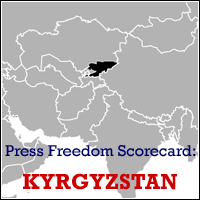 Privatization of local and regional state media stalled partly because of opposition from journalists working for the state. “Strangely, a lot of journalists in the state media don’t want independence from the government because they are more afraid of going bankrupt or of the oligarchs who would buy them,” said Tolkun Sagynova, a journalist in the Bishkek bureau of RFE/RL. As Bakiyev and parliament were locked in a struggle over constitutional reform last fall, the state broadcasters KTR, KOORT, and El TV aired coverage that was supportive of the president. By contrast, the private–and independent-minded–television station Pyramida was knocked off the air in fall 2006 when vandals destroyed $200,000 worth of transmission equipment.
OUTLOOK The more moderate policies of reformist leaders in Tbilisi, Kyiv, and Bishkek have led to some improvements in media freedom. But these politicians also remain intent on keeping Soviet-era prerogatives to limit independent reporting. All three countries face the economic and political influence of neighboring Russia, which has consistently opposed Western-oriented democratic reforms. The Kremlin has selectively restricted natural gas supplies to Ukraine and Georgia, backed two separatist regimes in Georgia with weapons and financial subsidies, and actively supported conservative, pro-Russian policies in all three countries. Such influence has encouraged reformist leaders to rule in a more secretive and centralized manner. Some lessons can be drawn from the Baltic nations of Estonia, Latvia, and Lithuania–the three post-Soviet states that have promoted Western-style press freedom. In each nation, strong public support for joining the European Union during the 1990s made EU-required legal and judicial reforms popular. That, in turn, created a stable, safe working environment for the media. But the Baltic countries had emerged from the Cold War less scarred than other former Soviet republics. Traditionally oriented toward the West, they had endured only 50 years of Soviet occupation, having missed the Revolution of 1917, the civil war of the 1920s, and the Stalinist terror of the 1930s. The Color Revolution nations face differing challenges. Ukraine’s geographic proximity to the European Union and cultural affinity with neighboring EU member Poland make the country more open to political and economic reforms. Georgia appears committed to joining Western institutions if only because of its vulnerable location between Russia, immediately to the north, and Iran, little more than 100 miles (160 kilometers) to the south. Prospects for serious reform are less likely in Kyrgyzstan, which is bounded geographically by repressive Central Asian regimes and influenced politically by a Soviet-style political elite. While revolution has undoubtedly spurred the media to play a greater role in each of these societies, without further government reform and greater tolerance for criticism, many journalists in these countries will remain dependent on bureaucrats and oligarchs for financial support and political protection. The ingredients for lasting reform are political and economic, local and international. Curbing corruption and undue outside influence in the judicial and regulatory systems would make it far more difficult for politicians to repress the independent media. Economic growth to reduce financial dependence on politicized businesspeople would increase editorial freedom. A greater editorial emphasis on professional, ethical news reporting would enhance the public trust. Western powers and international organizations could be more consistent and vocal in condemning abuses against the media–even when they are committed by pro-Western governments. Greater support in the West for local organizations that assist journalists with legal defense, advocacy, and training could help independent media become more active in fighting for their rights. “There is definitely more pluralism today, but a lot remains to be done, ” said Lebedeva, head of the Kyiv broadcasting association. “If you don’t strengthen the gains, they can easily be taken away.” Alex Lupis , a Moscow-based freelance journalist, was CPJ’s Europe and Central Asia program coordinator from 2000 to 2006. |
||
 The following day, as 3,000 people gathered outside parliament to protest the raid–ordered, ostensibly, as part of a tax probe but seen widely as political retaliation–government leaders were contrite. National Security Minister Vakhtang Kutateladze resigned, and President Eduard Shevardnadze announced on public television, “As president, I consider myself guilty as well.” The station’s influential and hard-edged coverage over the next two years helped mobilize public outrage against the pervasive corruption and poverty that marked Shevardnadze’s rule, leading to his eventual ouster in November 2003 in what came to be called the Rose Revolution.
The following day, as 3,000 people gathered outside parliament to protest the raid–ordered, ostensibly, as part of a tax probe but seen widely as political retaliation–government leaders were contrite. National Security Minister Vakhtang Kutateladze resigned, and President Eduard Shevardnadze announced on public television, “As president, I consider myself guilty as well.” The station’s influential and hard-edged coverage over the next two years helped mobilize public outrage against the pervasive corruption and poverty that marked Shevardnadze’s rule, leading to his eventual ouster in November 2003 in what came to be called the Rose Revolution.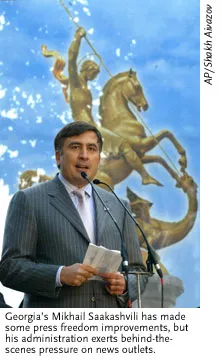 During his first year in office, Saakashvili and his National Movement party improved media freedom by decriminalizing libel and the publication of state secrets. Attacks against journalists declined during the new government’s honeymoon with the independent media. News coverage seemed to observe a ceasefire as well. “For about a half year after the revolution, the media reported on the new government’s actions without criticism, which was understandable because [journalists and the opposition] were so close to each other in the last years of Shevardnadze’s rule,” said Tamara Chikovani, a journalist with the Tbilisi bureau of Radio Free Europe/Radio Liberty (RFE/RL).
During his first year in office, Saakashvili and his National Movement party improved media freedom by decriminalizing libel and the publication of state secrets. Attacks against journalists declined during the new government’s honeymoon with the independent media. News coverage seemed to observe a ceasefire as well. “For about a half year after the revolution, the media reported on the new government’s actions without criticism, which was understandable because [journalists and the opposition] were so close to each other in the last years of Shevardnadze’s rule,” said Tamara Chikovani, a journalist with the Tbilisi bureau of Radio Free Europe/Radio Liberty (RFE/RL).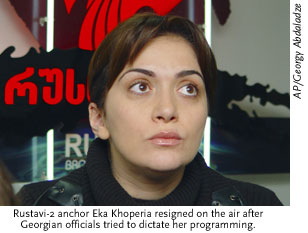 In July 2006, Rustavi-2 anchor Eka Khoperia abruptly resigned during a live broadcast of her political talk show “Free Topic ” to protest government officials’ dictating which guests could appear. “Several senior people in the government would regularly call me and tell me how to prepare upcoming programs,” Khoperia said. The next month, Rustavi-2 dismissed Tabatadze and appointed Koba Davarashvili, an advertising executive and a friend of Giorgi Arveladze, Saakashvili’s chief-of-staff. Six prominent journalists resigned to protest the dismissal and the owner’s close association with the Saakashvili administration.
In July 2006, Rustavi-2 anchor Eka Khoperia abruptly resigned during a live broadcast of her political talk show “Free Topic ” to protest government officials’ dictating which guests could appear. “Several senior people in the government would regularly call me and tell me how to prepare upcoming programs,” Khoperia said. The next month, Rustavi-2 dismissed Tabatadze and appointed Koba Davarashvili, an advertising executive and a friend of Giorgi Arveladze, Saakashvili’s chief-of-staff. Six prominent journalists resigned to protest the dismissal and the owner’s close association with the Saakashvili administration. 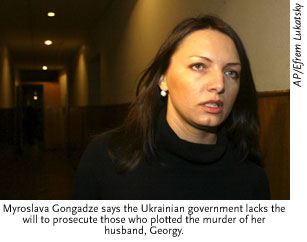 The journalist’s wife, Myroslava Gongadze, is among many who have criticized the narrow focus of the inquiry. “I’m afraid that I do not see a political will in Ukraine today to bring the officials accused of ordering this crime to justice,” she told CPJ.
The journalist’s wife, Myroslava Gongadze, is among many who have criticized the narrow focus of the inquiry. “I’m afraid that I do not see a political will in Ukraine today to bring the officials accused of ordering this crime to justice,” she told CPJ.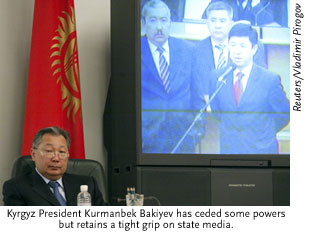 One of Bakiyev’s main goals was to transform state broadcaster Kyrgyz National Television and Radio Corporation (KTR) into an independent public-service broadcaster and to privatize state media in the country’s regions. As a result of this and other anticipated press freedom reforms, KTR and several private media outlets supported Bakiyev in the ensuing presidential vote, which he easily won.
One of Bakiyev’s main goals was to transform state broadcaster Kyrgyz National Television and Radio Corporation (KTR) into an independent public-service broadcaster and to privatize state media in the country’s regions. As a result of this and other anticipated press freedom reforms, KTR and several private media outlets supported Bakiyev in the ensuing presidential vote, which he easily won.